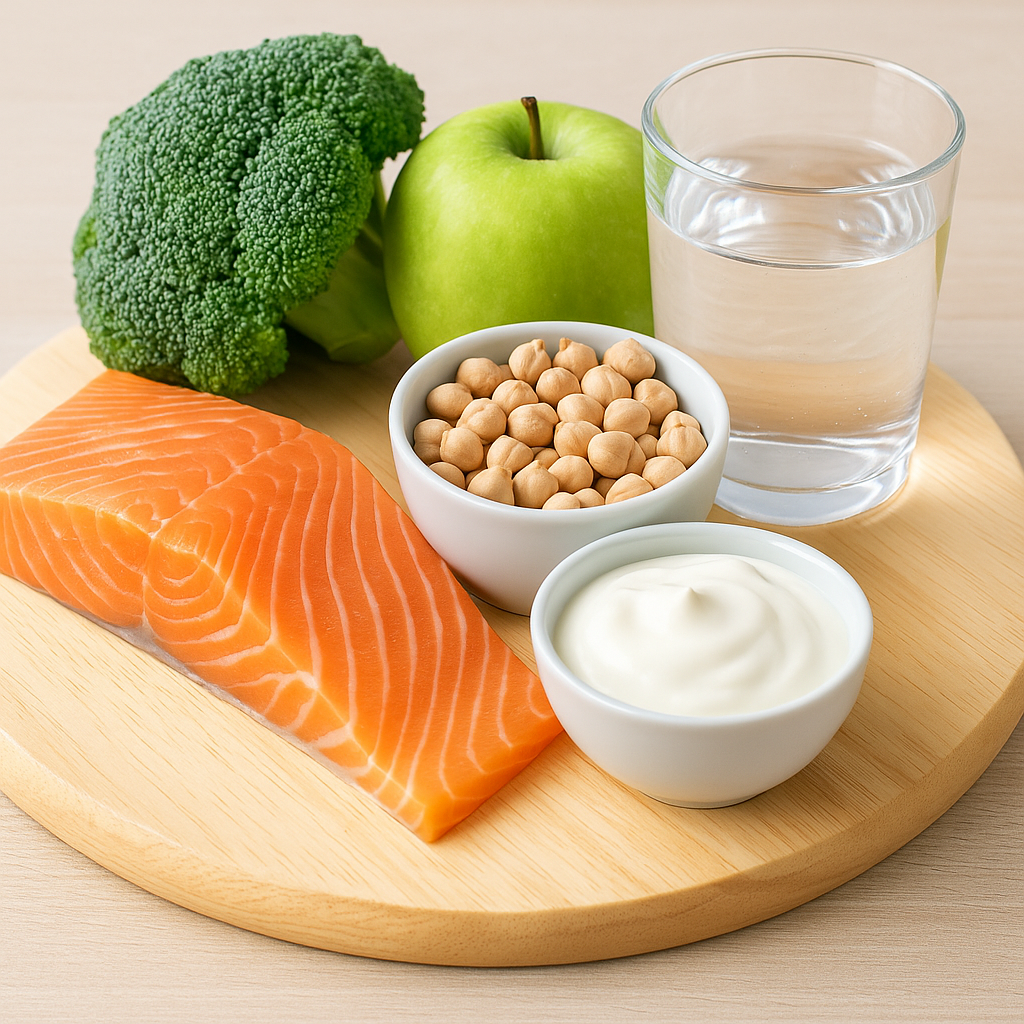Balance isn’t only about strong legs or a steady step — it begins on the inside. What you eat and drink every day affects how your muscles work, how your nerves respond, and even how your brain maintains coordination.
For many seniors, improving balance starts not in the gym, but in the kitchen and at the table.
Good nutrition and steady hydration build a foundation for strength, energy, and clear thinking — all essential for safe movement.
The Hidden Connection Between Food and Balance
As we grow older, our bodies change in quiet ways. Muscles weaken a bit, reflexes slow, and appetite sometimes fades.
But with the right nutrients, you can fight those changes naturally.
Balanced meals keep your energy levels stable, your muscles stronger, and your brain sharp enough to react quickly if you ever start to lose your footing.
Without that nourishment, the risk of fatigue, dizziness, and falls increases — even if you’re active.
🧠 Good nutrition is invisible support — you don’t see it working, but you feel it in every confident step.
1. Protein: The Muscle Protector
Muscle loss (sarcopenia) starts gradually, but protein can slow it down dramatically.
Seniors need more protein than they might think — about 20–30 grams per meal, spread throughout the day.
Great protein sources:
- Lean chicken, fish, turkey, or eggs
- Greek yogurt and cottage cheese
- Beans, lentils, and tofu
- Smoothies made with protein powder or nut butter
Protein rebuilds muscle tissue and fuels recovery after activity or physical therapy. It’s also a major player in balance — strong muscles = steady movement.
💪 If chewing is difficult, blend proteins into soups, puddings, or shakes — softness doesn’t mean less nutrition.
2. Calcium and Vitamin D: The Bone Builders
Your bones and muscles work together like hinges and doors — if one weakens, the other struggles.
Calcium keeps bones strong, while Vitamin D helps your body absorb it. Both are essential for preventing fractures if a fall ever occurs.
Sources of calcium:
- Milk, cheese, and yogurt
- Fortified almond or soy milk
- Leafy greens like kale and collards
- Canned salmon or sardines with soft bones
Sources of vitamin D:
- Sunlight (10–15 minutes daily, as tolerated)
- Fortified dairy or plant milk
- Fatty fish like salmon or tuna
- Supplements (as recommended by your doctor)
☀️ Many seniors are low on Vitamin D without realizing it — a simple blood test can confirm your levels.
3. Magnesium and Potassium: The Muscle Coordinators
Ever felt dizzy when standing or experienced muscle cramps at night?
Low magnesium or potassium might be to blame. These minerals support nerve signals and muscle contractions — the very systems that keep you balanced.
Top magnesium sources:
- Nuts and seeds (almonds, pumpkin seeds)
- Spinach and avocados
- Whole grains
- Dark chocolate (in moderation!)
Top potassium sources:
- Bananas and oranges
- Sweet potatoes
- Beans and lentils
- Yogurt and coconut water
🦵 When these minerals are in balance, your muscles respond faster and your steps feel steadier.
4. B Vitamins: Energy and Brain Support
Feeling sluggish or lightheaded can make you hesitate when you walk — a common issue linked to low B vitamins.
These nutrients keep your nervous system sharp and your body’s energy levels stable.
Foods rich in B vitamins:
- Eggs and whole grains
- Leafy greens and peas
- Meat, poultry, and fish
- Fortified cereals
B12 deserves special attention. Older adults often absorb it poorly from food alone, so supplements or fortified products can help.
💡 Steady energy means steady steps — think of B vitamins as your inner battery chargers.
5. Stay Hydrated — It’s More Important Than You Think
Dehydration is one of the most overlooked causes of balance problems and dizziness in older adults.
Even mild dehydration can make you feel lightheaded, confused, or unsteady.
Your body also loses its natural thirst cue with age — meaning you might not feel thirsty even when you need water.
How to stay hydrated effortlessly:
- Keep a reusable water bottle nearby throughout the day.
- Add lemon, cucumber, or berries for flavor.
- Drink water before and after walking, therapy, or activity.
- Limit caffeine and alcohol, which dehydrate the body.
💧 If your lips are dry or your urine is dark yellow, you’re already behind — drink up before thirst hits.
6. Eat for Brain Balance Too
Your brain is your body’s control center for balance — and it thrives on nutrients.
Foods rich in omega-3s, antioxidants, and healthy fats keep your nervous system and cognitive function strong.
Brain-boosting foods:
- Salmon, walnuts, chia seeds (omega-3s)
- Berries, oranges, and dark leafy greens (antioxidants)
- Olive oil and avocados (healthy fats)
🧩 Balance isn’t only physical — mental clarity and quick reflexes play a major role in how confidently you move.
7. Small Habits That Make a Big Difference
Healthy eating doesn’t have to mean overhauling your diet. Try simple, lasting habits:
- Eat small, frequent meals to keep energy stable.
- Include a source of protein at every meal.
- Sip fluids regularly, even if you’re not thirsty.
- Keep nutritious snacks (nuts, yogurt, fruit) close by.
- Set reminders if you tend to forget meals or water.
Caregivers can help by preparing balanced snacks, offering fluids often, and tracking meal times — small acts that prevent big setbacks.
8. When to Ask for Professional Help
If you’ve been feeling dizzy, weak, or unusually tired, it’s worth talking to your healthcare provider.
They can check for nutrient deficiencies, review medications that might cause imbalance, or refer you to a dietitian who specializes in senior nutrition.
You can also request a fall risk assessment — where your diet, hydration, and balance are reviewed together for a full picture of your wellness.
🩺 You don’t have to guess — personalized advice can make healthy eating simple and effective.
Final Thoughts
Balance begins long before you take your first step.
It’s built meal by meal, glass by glass, through consistent nourishment that strengthens muscles, fuels your brain, and hydrates every cell in your body.
The best part? You don’t need complicated diets or expensive supplements — just steady, thoughtful choices that keep you strong, focused, and ready for life.
🥣 Eat well, move often, hydrate deeply — your balance depends on it.
Recommended Reading:
- Physical Therapy for Strength and Balance: Build confidence through guided movement.
- Stability & Comfort Shoes: Support your feet for safer steps.
- Safe Movement at Home: Simple home changes for lasting security.
💬 Frequently Asked Questions
1. Can what I eat really affect my balance?
Yes. Your muscles, nerves, and brain all depend on proper nutrition. Eating balanced meals with enough protein, vitamins, and minerals helps you stay strong, focused, and steady on your feet.
2. How much water should seniors drink each day?
Most older adults need around 6–8 cups of fluids daily, but that includes soups, fruits, and tea. Sip water regularly throughout the day — even if you don’t feel thirsty — to prevent dizziness and fatigue.
3. What foods are best for preventing dizziness?
Choose meals rich in hydration and minerals. Bananas, leafy greens, yogurt, and lean proteins help stabilize blood pressure and energy. Avoid skipping meals or relying too much on salty snacks.
4. How can caregivers help seniors stay nourished and hydrated?
Encourage small, frequent meals and keep a glass of water nearby at all times. Offer nutrient-rich snacks like fruit, cheese, or smoothies, and make hydration part of the daily routine.
5. Are supplements necessary for better balance?
Sometimes. If you have difficulty eating enough protein or getting vitamins like D or B12, a doctor or dietitian may recommend supplements. Always check before starting new ones, as some can interact with medications.
6. Can dehydration really cause balance problems?
Absolutely. Even mild dehydration can lead to dizziness, low blood pressure, and slower reflexes. Staying hydrated helps your body regulate blood flow and muscle control — both essential for balance.





